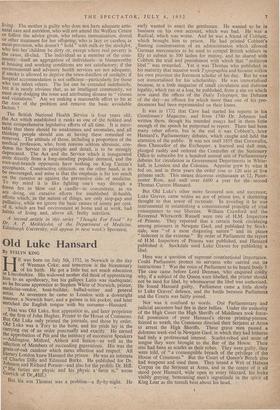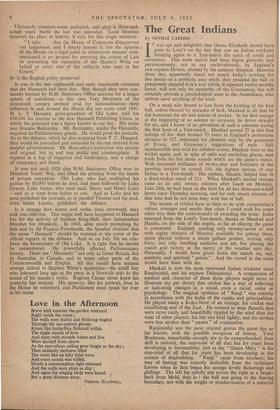Old Luke Hansard
By EVELYN KING E was born on July 5th, 1752, in Norwich in the day of Wenman Coke; and tomorrow is the bicentenary of his birth. He got a little but not much education in Lincolnshire. • His widowed mother did think of apprenticing him to an apothecary, but his' gallipot Latin was inadequate; so he became apprentice to Stephen White of Norwich, printer, medicine-vendor, boat-builder, ballad-writer and general artist. At seventeen he came to London with a• downright manner, a Norwich burr, and a guinea in his pocket, and later enriched the English tongue with his surname—Hansard.
That was Old Luke, first apprentice to, and later proprietor of, the firm of John Hughes, Printer to the House of Commons. But Old Luke only printed the journals, and those by order. Old Luke was a Tory to the bone, and his pride lay in the carrying out of an order punctually and exactly. He earned the approbation of Pitt and the intimacy of successive Speakers —Addington, Mitford, Abbott and Sutton—as well as the affection of Members of succeeding geperations. His was the grain-of-oak candour which earns affection and respect. All literary London knew Hansard the printer. He was an intimate 'of Charles Dilly and Edmund Burke. He published for Dr. Johnson and Richard Porson—and also for the prolific Dr. Hill. (" His farces are physic and his physic a' farce is," wrote Garrick of Dr.jclill.) But. his son Thomas was a problem—a fly-by-night. He early wanted to enact the gentleman. He wanted to be in business on his own account, which was bad. He was a Radical, which was worse. And he was a friend of Cobbett, which brought him to prison. He had printed Cobbett's flaming condemnation of an administration which allowed • German mercenaries to be used to compel British soldiers in Ely to submit to 500 lashes for mutiny, and he shared with Cobbett the trial and punishment with which that " seditious libel " was rewarded. Yet it was Thomas who published in his maturity that massive work Typographia and became within his own province the foremost scholar of his day. But he was not immortalised for his scholarship. He was immortalised because, in a little magazine of small circulation and dubious legality, which ran at a loss, he published, from a site on which now stand the offices of the Daily Telegraph, the Debates of the day—an offence for which more than one of his pre- decessors had been reprimanded on their knees.
It was in 1732 that Cave had started his reports in his Gentleman's Magazine, and from 1740 Dr. Johnson had written them, though his rounded essays had in them little enough of the speech he purported to report. There had been many other efforts, but in the end it was Cobbett's„ later Hansard's, Parliamentary debates, which caught and held the attention of the public. It was not until 1855 that Cornwallis, then Chancellor of the Exchequer, a learned and dull man, plunged rashly and ordered the Controller of the Stationery , Office-tb subscribe for a hundred annual sets of Parliamentary debates, for circulation in Government Departments in White- hall, in London and the Colonies. Appetite grew by what it fed on, and in three years the order rose to 120 sets at five guineas each. This meant decorous enthusiasm at 12, Pater- noster Row, and well over £600 a year for the ) second Thomas Curzon Hansard. • But Old Luke's other more favoured son, and successor, Luke Graves, came within an ace of prison too; a shattering thought to that tower of rectitude. In avoiding it he was instrumental in establishing a constitutional principle of vital consequence to our liberties. William Crawford and the Reverend Whitworth Russell were two of H.M. Inspectors of Prisons. They reported that a certain book circulating among prisoners in Newgate Gaol, and published by Stock- dale, was " of a most disgusting nature " and its plates " indecent in the extreme." By order of Parliament the report of H.M. Inspectors of Prisons was published, and Hansard published it. Stockdale sued Luke Graves for publishing a libel.
Here was a question of supreme constitutional importance. Could Parliament protect its servants who carried out its instructions Was the voice of Parliament to be heard freely ? The case came before Lord Denman, who enquired coldly why, if a subject of the Queen were libelled, the printer should not be sued for libel, by whomsoever the libel was authorised. He found Hansard guilty. Parliament came a little slowly to Luke Graves' defence, and the battle .between Parliament and the Courts was fairly joined.
Nor was it confined to words. Our Parliamentary and judicial ancestors had fire in their bellies. Under the authority of the High Court the High Sheriffs of Middlesex took force- ful possession of poor Hansard's eleven printing-presses. Stirred to wrath, the Commons directed their Serjeant at Arms to arrest the High Sheriffs. These grave men passed a dolorous week-end in Newgate Gaol, in which they had hitherto had only a professional interest. Scarlet-robed and mute of tongue they were brought to the Bar of the House. Their sins had been as scarlet as their robes. They were guilty, they were told, of " a contemptible breach of the privilege of the House of Commons." But the Court of Queen's Bench also had weapons and used them. They issued a Writ of Habeas Corpus on the Serjeant at Arms, and in the centre of it all stood poor Hansard, wide open to every blizzard, his locks visibly greying, bemoaning man's ingratitude in the spirit of King Lear as the tumult beat about his head. Ultimately common-sense prevailed, and after a three-and- a-half years' battle the law was amended. Lord Denman deserves his place in history, if only for this single sentence: " I infer . . . that the House of Commons disapproves our judgement, and I deeply lament it, but the opinion of the House on a legal point in whatsoever manner com- municated is no ground for arresting the course of Law or preventing the operation of the Queen's Writs on behalf of every one of her subjects who sues in her Courts."
So is the English polity preserved.
It was in the late eighteenth and early nineteenth centuries that the Hansards had their day. But, though they were con- stantly harried by H.M. Stationery Office anxious for a larger sphere of usefulness—in this case Tory Ministers of the nineteenth century seemed avid for nationalisation—their influence in and around the House did not cease until 1890. H. L. T. Hansard, great-grandson of Old Luke, sold for £90,000 his interest to the new Hansard Publishing Union, in which the principal was a figure known in our day. His name was Horatio Bottomley. Mr. Bottomley, unlike the Hansards, required no Parliamentary grants. He would print the journals. As to the debates, which he also acquired from T. C. Hansard, they would be nourished and sustained by income derived from tasteful advertisement. Mr. Bottomley's enterprise was private and original, but its end was public and commonplace. It expired in a fog of litigation and bankruptcy, and a charge of conspiracy and fraud.
It was not until 1920 that H.M. Stationery Office won its Hundred Years' War, and lifted the printing from the hands of private enterprise. Old Luke, who had, multiplied his guinea by 80,000 before he died, had been followed by Luke Graves, Luke James, who went mad, Henry and Henry Luke —and so it went from father to son. And as Luke and his seed published the journals, so in parallel Thomas and his seed, even better known, published the debates.
It is strange how nouns and verbs, once renowned, may sink into oblivion. This might well have happened to Hansard but for the activity of Stephen King-Hall, then Independent Member for Ormskirk. In 1943, after much prompting by him and by Sir Francis Freemantle, the Speaker directed that the name Hansard " should be restored to the cover of the official reports of the debates. And so on July 5th we cele- brate the bicentenary of Old Luke. It is right that he should be remembered. He powerfully affected Parliamentary history. There are " Hansards " not only in'Great Britain, but in Australia, in Canada, and in many other parts of the Commonwealth and Empire. All this would have seemed strange indeed to Stephen White's apprentice—the small boy who laboured long ago at the press in a Norwich attic to the sound of his master's violin. Regions Caesar never knew his posterity has swayed. His memory, like his portrait, lives in the House he venerated, and Parliament must speak for ever in his name.



























































 Previous page
Previous page